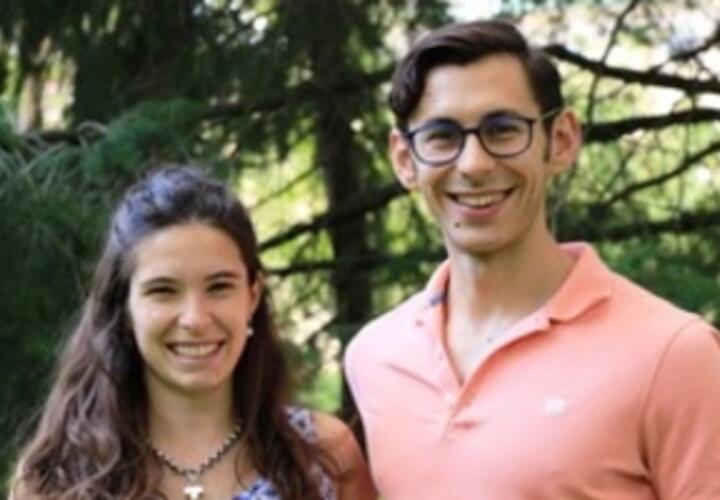Scarf Summer RA Program Still Going Strong Thanks to Graduate Mentors

As the Herb Scarf Summer Research Opportunities in Economics concluded another successful year, it remains a popular and coveted program for undergraduate students. With upwards of 30 research assistants (RAs) working closely with the Department of Economics and School of Management faculty members during the summer recess, it is a unique opportunity for undergraduate students to experience statistical and analytical research first-hand. The program’s success is also aided by graduate student mentors who lead the program by organizing weekly workshops, panel discussions, and outings for the RAs.
For the last three years, Lucas Zavala and Paula Calvo have acted as RA mentors in an effort to foster a sense of community among the undergraduates and expose the RAs to skills and methods that can benefit them in their work. “Programs like this are important despite its prevalence in academia, policy, and business, research remains poorly advertised,” said Zavala. “Not a single economics major will graduate without being exposed to finance, consulting, or entrepreneurship in one way or another. The same cannot be said of research. We don’t expect every student to go to graduate school, but we want them to know that it is an option and to understand what that option entails.”
Calvo has a similar view. “I think this program is important because it provides the students with the opportunity to explore how grad school would look. When we plan our schedule, we try to make the program as rich as possible, so they are exposed to a set of different activities we are exposed during grad school.”
The fifth-year Ph.D. graduate student mentors feel they have helped improve the program during their tenure, but not without its struggles. One change the mentors made this year was to cut the program down from eight to six weeks with more events during the week. By paring down the program length and allowing RAs to meet more frequently, students were more engaged from the beginning and felt like a group just a few weeks in, according to Zavala. “This year, I think, we finally found the right balance between structure and flexibility,” said Zavala.
Calvo agreed that shortening the program helped, but also attributed this year’s success to more advanced planning. “After our first summer, and especially this last summer, we started working in early March to make sure we would have a much more structured program,” said Calvo. “It worked quite well; we sent them the schedule right after they were accepted into the program, which included all the activities for the summer, and we set clear expectations that they had to be in New Haven during the duration of the program,” she continued.
The mentors learned that making adjustments is also key for a successful program, as the students’ interests tend to change from year to year. Zavala said last year more of the RAs were interested in pursuing graduate school directly after finishing their undergraduate studies compared to this year with more students being interested in policy fields before pursuing a doctoral degree. “This is why flexibility is important — we noticed right away that the students were interested in policy, so we encouraged our presenters to share their experiences and made sure our career panel reflected policy interests.”
While Zavala and Calvo are satisfied with the improved attendance, they both admit there are aspects of the program that can be enhanced. “We still haven’t quite figured out what they need in terms of technical training,” said Zavala. “Some of these students have only ever used Excel, while others are better programmers than we are. Pitching the programming workshops at the proper level is an ongoing challenge,” he continued.
Calvo also noted that the number of female RAs was lower than years past. “Last year was much more balanced, but this year we only had a few female students,” she said. “Still, I think we had a quite diverse group which enriches the program.” Along those same lines, both mentors stressed the importance of gender balance in graduate student directing the program. “Different students come to each of us with different types of concerns and questions, and some students felt more comfortable talking to me and others to Lucas. It has been great,” she said.
Zavala and Calvo will be handing the torch to new mentors next year. They expressed that mentoring has been well-worth the experience for them. “My favorite part about being a mentor is the feeling that you have made your students’ lives better,” said Zavala. “I remember being an undergraduate, so eager to learn more about the professional world. A lot of the knowledge that mentors have can take months of experience for a newcomer to learn alone. To share it in a few words is a wonderful gift.”
Calvo echoed similar sentiments. “It has been very rewarding to see how students come to us every summer looking for advice, about doing research, applying to grad school, interacting with professors, etc. I am surprised about their level of commitment with the program and the research, and how eager they are to learn new things. Also, they are always very respectful, grateful and friendly, and interacting with them every summer was very fun!”
In the end, the mentors were grateful for the experience. “We had the opportunity to be role models to them, sharing our own experiences, and what we learned along the way (also from our mistakes),” said Calvo. “Mentoring is an important part of professional development, but there aren’t nearly as many opportunities to practice as there are for other skills,” said Zavala.
Major funding from Yale’s Cowles Foundation for Research in Economics in 2016 helped to nearly quadruple the number of RAs. For additional information on the Scarf RA program, application eligibility, and past projects visit the Herb Scarf Summer Research Opportunity webpage.
